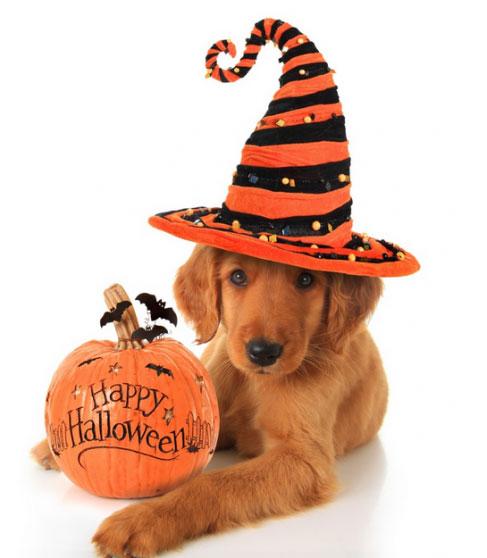
Make Halloween Safer for Pets
Tuesday, October 24, 2017
Halloween can be scary for pets. Strange costumes, eerie noises and tempting treats that can be deadly.
The American Veterinary Medical Association, PetMD, and the American Animal Hospital Association offer these tips for pet owners.
Keep Halloween candy away from pets. Chocolate can be dangerous, even lethal for dogs and cats. Symptoms of chocolate poisoning may include vomiting, diarrhea, rapid breathing, and seizures.
Candy containing xylitol (a common sugar substitute used in sugar-free candies and gum) can also be poisonous to dogs. Small amounts of xylitol can cause a sudden drop in blood sugar, subsequent loss of coordination, and seizures.
Candy wrappers, if consumed, can cause obstruction or irritation in the pet’s digestive system.
Keep pets away from the door in a safe, secure room. Dogs can be territorial and growl at innocent trick-or-treaters. Frightening costumes and noises can cause dogs and cats to slip out the door and escape!
Should your pet escape while you hand out candy, be sure it is properly identified. Keep your pet’s microchip information current and have your contact information on his/her collar.
Be sure decorations are safe from curious paws and teeth. Cardboard decorations, glow sticks, and plastic spiders can easily be chewed and swallowed damaging your pet’s digestive tract.
Keep candles and jack-o-lanterns out of reach. Pets can burn themselves or tip them over and start a fire.
Make sure wires and electric cords are also out of reach. If chewed, your pet could possibly be electrocuted.
What about a costume for your pet? For some pets, dressing up can be stressful. If your furry friend doesn’t mind wearing a costume, here are some things to keep in mind:
- Costumes should not restrict your pet’s movement, breathing, hearing, or sight
- Make sure the costume fits properly
- Avoid pieces that can be easily chewed off
- Try on your pet’s costume in advance of Halloween to give him/her time to adjust to wearing it.
If your pet should consume anything that might be harmful to its well-being, contact your veterinarian immediately.
Take precautions and avoid an unwanted trip to the emergency room. Keep all your family members safe and happy this Halloween.
Veterinary Viewpoints is provided by the faculty of the OSU Veterinary Medical Hospital. Certified by the American Animal Hospital Association, the hospital is open to the public providing routine and specialized care for all species and 24-hour emergency care, 365 days a year.
